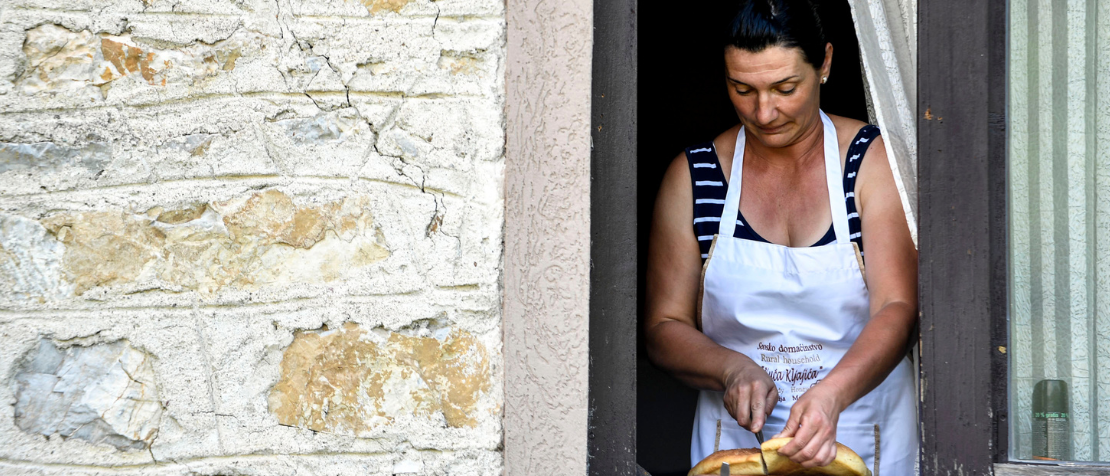Rural women take centre stage in Montenegro’s Parliament as historic declaration is adopted

©EBRD/FAO Dermot Doorly
On 8 May 2025, the Parliament of Montenegro hosted the 18th session of the “Women’s Parliament,” under the theme “Voices of Women from Rural Montenegro.” The session aimed to amplify the voices of rural women, recognize their contributions and advocate for their stronger representation in public life. It culminated in the adoption of the Declaration of the First Rural Women’s Parliament, a significant step toward inclusive policymaking and the recognition of rural women as key contributors to sustainable development.
The event was organized by the Committee for Gender Equality and the Women’s Club of the Parliament, in collaboration with the Rural Development Network of Montenegro, the Ministry of Agriculture, Forestry and Water Management, and the Food and Agriculture Organization of the United Nations (FAO). It brought together Members of Parliament, representatives of rural communities, line ministries, civil society organizations, the diplomatic community and international development partners.
“This declaration must shape an institutional response to the needs of rural women, from education and healthcare to support for entrepreneurship and equal political participation,” said Vice President of the Parliament Zdenka Popović. She emphasized that rural women are often the foundation of their communities but remain underrepresented in decision-making processes.
“FAO’s commitment to gender equality in agriculture is not only a matter of principle, it’s a key driver of progress,” said Nabil Gangi, FAO Deputy Regional Representative for Europe and Central Asia and Head of the FAO Office in Montenegro, as he addressed the gathering. He described the session as a powerful and symbolic moment of change but stressed that rural communities deserve more than recognition and must be fully included in public life.
Addressing persistent inequalities
Gangi also highlighted the ongoing development of the first National Gender Profile of Agriculture and Rural Livelihoods: Montenegro, prepared under the FAO–United Nations Development Programme (UNDP) EmpowHer Montenegro initiative. “This is not just a report: it is a reflection of lived realities, challenges and the strength of rural women,” he said.
Preliminary findings of the Country Gender Assessment point to persistent inequalities that continue to limit women’s opportunities and leadership in the agriculture sector. Only 13 percent of family farm holders in Montenegro are women, with less than 20 percent of agricultural land registered in their name. Many rural women face barriers to accessing credit, markets, advisory services and professional networks. In addition, time constraints caused by unpaid care responsibilities remains one of the most pressing and least addressed obstacles to their participation in economic and public life.
These findings highlight the very challenges that the FAO Policy on Gender Equality 2020–2030 seeks to address. The policy aims to transform agrifood systems and institutions so that gender considerations are integrated at every level, from data collection and programme design to funding and policymaking. It reflects FAO’s commitment to supporting countries as they work to create enabling environments for women in agriculture and rural development.
Commitment at policy and programme levels
Complementing this vision, the Declaration adopted during the session outlines concrete actions to enhance rural women’s participation in public life, improve their access to economic opportunities and ensure that their needs and perspectives are reflected in national strategies.
At the programme level, through EmpowHer Montenegro, FAO has helped rural women access entrepreneurship training, build business networks and adopt climate-resilient agricultural practices. In its first year, the programme supported over 60 women with tailored training and engaged more than 300 participants through networking and visibility events.
Looking ahead
The outcomes of the session underscore a growing commitment in Montenegro to place rural women at the center of sustainable development. With national frameworks evolving and mechanisms for dialogue now in place, their voices are increasingly shaping the policies that affect their lives and communities.
As Gangi emphasized, rural women are essential leaders and drivers of transformation whose strength and contributions must be fully recognized and supported. “Let us ensure that the future of agriculture in Montenegro is not only built with rural women, but led by them,” he said. Building on its strong partnership with national institutions, FAO will continue to support efforts that advance gender equality through policy dialogue, technical expertise and capacity development, while strengthening the leadership of rural women across agrifood systems.
Furthermore, the recently completed 2024 national demographic census should provide sex-disaggregated data, which is necessary for creating a robust evidence base for gender-responsive policymaking at both national and local levels in agriculture and rural development.
